
by user_dd | Apr 26, 2022 | Community Conversations
Shamanism is all about relationships. In this post, we’re going to explore what a shaman is, what role shamanism has played in different cultures around the world, and lastly, how a shamanic perspective can be integrated into your life.
So, what is a shaman?
Tracked back to the late 17th century through Russian etymology, the term shaman most likely originated in North Asia, where the Manchu-Tungus language described a personified version of the verb ‘to know’ (sa); the shaman is ‘one who knows’. Now, you may be thinking…the one who knows what? Perhaps we can think of it as the one who knows what we may not know.
What sorts of folks are there in your life that you look to for something you do not ‘know’? Perhaps a mechanic, or a doctor…you could think of anyone that you go to with trust. You trust that they know something that you do not. Now, when thinking of someone like this, there are aspects of training and experiential wisdom that are essential to trust building. This experiential wisdom, across pretty much every culture, looks like deep service in healing work for their communities.
Shamans are found in many different traditions, spanning across each continent, often sitting at the intersection of healing, arts, medicine and ritual. Within many traditions, we see correlations between shamanism and community health; bridging art into medicine and healing into ritual can make a big impact on a culture.
So, back to relationships. Bridging these oftentimes segmented and compartmentalized portions of society is the work the shaman does. Why? Because it’s important to understand (and tend) the relationships between and amongst all things.
The Here & Now
Alright, so maybe now you can feel more of a sense of what a shaman may be, and what role they’ve served their communities. Other than being vital contributors to the health of their community ecosystems, shamans are super connectors. They bridge realms, through and amongst dimensions, between and across species, and within many timelines. This is a way of being in relationship.
Is there an animal spirit that you feel a strong connection to? How could you strengthen this relationship? Perhaps it’s drawing the animal, or doing a dance to embody the feeling that this animal evokes in you.
At the end of the day, we are at a point in human history where it’s important for us to trust ourselves. We can begin to start sourcing internally what we’ve traditionally outsourced because we hadn’t invited our innate gifts to come fully online.
The time has arrived to empower our inner knowing, so that we can walk through life in the right relationship with the part of us that ‘knows’. In essence, there is an aspect of us that is shamanic, and that has shamanic abilities. It’s time to invite ourselves into trusting what comes through, feeling empowered by our inner knowing, staying surrendered to the fact that oftentimes the more we know, the more we know that we don’t know…
Humility is key, let’s keep expanding, friends!

by user_dd | Jan 26, 2022 | Community Conversations
It’s Time to Reclaim the Culture of Healing
What even is a cult? The word ‘cult’ gets thrown around in our modern times with a flippant ease of judgment. Yet, what does this term really mean? Sure, there have been (and still are) many subgroups organized around religious dogma that are sustained through hierarchical dominance structures that are unhealthy to their core, including all sorts of distortion of truth and corruption of purity.
This, in many ways, needs to evolve like many other aspects of our modern day culture. But let’s acknowledge that the presence of these negative expressions of culture have tainted the word that is otherwise value free and objective in its description of what is. There is an aspect of this term that is all too quickly slapped onto any organized group with a spiritual quest. This aspect, creating an easeful ‘go-to’ grip for folks trying to deepen the separation story of the psyche, seems to exhibit a consistent misunderstanding of esoteric study.
Just because it’s occult, doesn’t make it a cult. And even if it did, is a ‘cult’ inherently nefarious? There are both benevolent and malicious politicians, aren’t there? It seems there’s an opportunity that’s presenting itself for us to heal the damage, bridge the chasm, and harmonize the trauma around spirituality through the lens of this term.
Building Culture
We’ve largely contained the term ‘culture’ within the psychological confines of social and political frameworks and applications. Yet, when we look at the term ‘culture’ through the lens of biology or agriculture, we find that there are many important aspects of the findings that we’d benefit from applying to the social and political realms. Growing and sustaining a healthy culture depends on a myriad of delicate variables. Domination within a culture doesn’t translate to harmony or symbiosis.
Life thrives with diversity, with strong willed and independent parts participating in a whole. We can be this way, as a species. We can contribute to the whole in beneficial ways when we deeply recognize ourselves as a part of it, not apart from it. This means we must evolve out of the archaic ‘cult’ concept (both in our assignment of this term to occult pursuits, and our application of obsolete control within those groups considered to be cult-like).
Gone are the days of worshiping external entities. We’re remembering, slowly but surely, that all that’s outside us is within us, and therefore, worshiping the body temple we’re currently incarnated in is key to our development. Alas, this means we don’t need to kneel before a dominant leader when we really recognize the omnipotent Source of Creation as that which is innately within us, as our birth right.
Transformation is Uncomfortable!
The roller coaster of healing and wholling isn’t for the faint of heart. Remembering our innate wholeness is a path that’s filled with moments of big change and recalibration. For those jostled by change, both internal and external, they’d likely prefer sitting beside the roller coaster and watching those shaking with anticipation as they ascend to new heights, and screaming as they plummet into the depths. Choosing to take the ride is only for those who can learn to manage their systems, command their ships, and embrace the discomfort of transformation.
These are the skillsets acquired through the spiritual path. No, not the path that leads you into an eddy of inertial patterns wrought with distorted traditions and outdated recitations. It’s the path of righteousness that empowers each individual with an embodiment of their free will, and an activation of this will as a conduit for benevolent creation to move through it.
More people are needed on this path; in order for our species to continue enjoying this planet we call home, we will need to wake up to the power that sits within ourselves in order to meet the pressures of change with the competent adaptability.
So where can we gather to awaken our innate abilities? Those abilities that empower us with the remembrance of the source of creation that lives within us? Within communities of practice, communities of therapy and healing, ignited from the inside out.
Therapeutic Communities
The etymology of the term ‘therapy’ can be tracked back through ancient Greece, expounding on the capacities to heal and cure. Yet, it seems we may have outsourced this ability to others, all too often. Ultimately, it’s the therapist’s role to simply amplify one’s awareness of the choices available to them, so they can feel empowered to make choices that resound with their own inner knowing.
So, what are therapeutic communities aiming to accomplish? An embodied, activated, and spiritually participatory populous that can meet the challenges we face as a species with empowered choice. The “fix me, doctor” culture must end. It is up to us as individuals to stop outsourcing our God-like abilities, and come back into belonging within communities that remind us of our essence. Whether or not they’re deemed ‘cults’….




